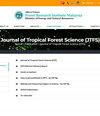A STANDARD FOR ASSESSMENT OF INDIAN MANGROVES RESPONSE TO SEA-LEVEL RISE USING RSET-MH TECHNIQUE
IF 0.8
4区 农林科学
Q4 FORESTRY
引用次数: 0
Abstract
Coastal systems, globally, including wetlands, marshlands and mangrove forests, face a severe threat due to climate change and rising sea levels. The Intergovernmental Panel on Climate Change Sixth Assessment Report (IPCC AR-6) has highlighted high-stress levels in South Asian coastal systems, particularly in the Indian Ocean. Mangrove systems are particularly vulnerable and rely on peat accumulation or landward migration to survive. The rod surface elevation table marker horizon (RSET-MH) technique finds widespread usage among researchers to comprehend the response of coastal wetlands to sea-level fluctuations. However, there is a need for national-level research on mangrove response to sea-level rise and for establishing RSET stations in mangrove forests across India. Establishing comprehensive and coordinated monitoring networks for coastal wetlands is proposed to address this gap. The present study outlined the methodology adopted in setting up the first RSET-MH station in Pichavaram mangrove forest, Tamil Nadu. The estimated cost of setting up a single RSET station ranges from INR 9,000 to INR 15,000. A coordinated monitoring system for RSET stations is crucial to ensure the survival of coastal systems in the face of climate change. The study outlined a coordinated monitoring system for RSET stations across India that will help authorities develop and implement coastal climate change adaptation strategies, critical to ensure the long-term survival of mangrove systems. It would also enable researchers to comprehend how coastal wetlands have responded to sea-level fluctuations in the past and present, and identify appropriate adaptation measures to prepare for future changes.利用重置- mh技术评估印度红树林对海平面上升反应的标准
本文章由计算机程序翻译,如有差异,请以英文原文为准。
求助全文
约1分钟内获得全文
求助全文
来源期刊
CiteScore
1.70
自引率
22.20%
发文量
61
审稿时长
3 months
期刊介绍:
The Journal of Tropical Forest Science (JTFS) is an international reviewed journal concerning the science, technology and development of tropical forests and forest products. The journal welcomes articles reporting original fundamental or applied research on tropical forest biology, ecology, chemistry, management, silviculture, conservation, utilization and product development. English is the official language of the journal. Only manuscripts with substantial scientific merit will be reviewed for originality, significance, relevance and quality.

 求助内容:
求助内容: 应助结果提醒方式:
应助结果提醒方式:


